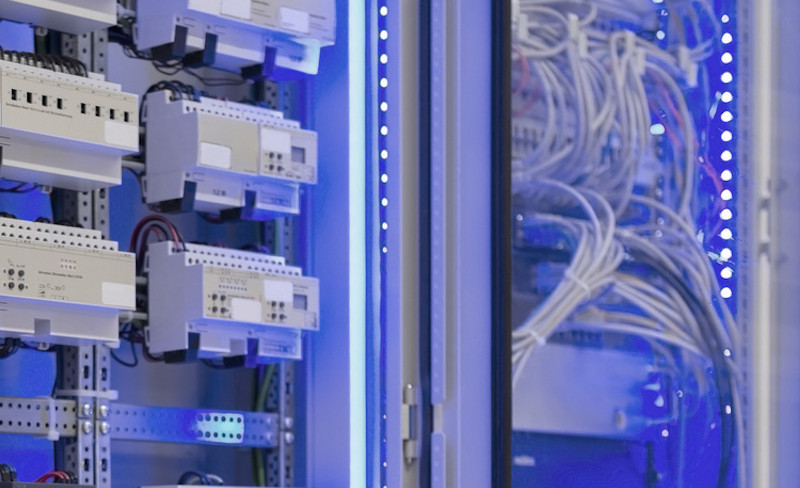“Overall, 2023 was quite good for the German electrical and digital industry,” says ZVEI President Dr. Gunther Kegel last year at the ZVEI annual press conference. “For the third time in a row, real, price-adjusted production was increased – by 1.4 percent based on the figures up to and including November.” This means that the industry has proven to be robust in a difficult environment. “But it is also true that companies were still able to process historically high order backlogs when new orders began to decline from the second quarter at the latest.” Last year, the industry’s nominal revenues again reached a record high of 242 billion euros (+ 8%). .
Once again, the industry, which is heterogeneous in its composition, has developed inconsistently. Batteries recorded the strongest production growth (+7%), followed by electronic components (+6%), energy technology (+4%) and automation (+3%). Consumer goods, on the other hand, recorded a significant decline (-13%). “It is pleasing that employment has increased again,” says Kegel. In Germany alone, the industry recently employed 910,000 people (+ 12,000 compared to 2022).
The electrical and digital industry is more global than almost any other industry. Exports (including re-exports) were increased again in 2023, by four percent to 256 billion euros. More than half – 133 billion euros – remained in the European Union. “In view of growing geopolitical tensions, the European internal market is becoming increasingly important,” explains the ZVEI President. “If the EU wants to continue to play an independent role between the USA and China, it must align the internal market more consistently with growth and abandon non-industry regulations such as the EU Supply Chain Act.” The next EU Commission must deal with the regulatory tsunami and a bureaucracy that is almost unleashed in parts stop the competitiveness of companies. “We now need a European Union that focuses on industrial value creation,” demands Kegel. The ZVEI president clearly rejects a “Dexit”: “Anyone who thinks that Germany could do better on its own is revealing dangerous economic policy ignorance.”
In view of the current difficult economic environment with inflation, relatively high interest rates and high energy prices, the ZVEI is cautious for 2024. Dr. Kegel: “The industry is facing a dip in growth. Over the course of the year, we expect real production to decline by two percent.”
A current ZVEI member survey shows that companies in the electrical and digital industries remain firmly committed to Germany and Europe as an industrial location. Four out of five companies say they would prefer to invest in their own country. For more than half, Europe, but also China, is an attractive investment location. Overall, 60 percent of companies want to increase their investment activity worldwide, although all companies rate the current geopolitical and political situation as uncertain. “Companies want to continue to take advantage of the opportunities that arise in this phase of industrial transformation,” explains Kegel, pointing out that the megatrends of electrification, digitalization and automation are still intact. “As the only large manufacturing sector, our real production is higher today than before Corona.”
Strengthen key technologies in ecosystems
The electrical and digital industry’s spending on research and development (€22.1 billion) and investments (€9 billion) is also at a record level and above pre-Corona levels. Many of the more than 13,000 patents registered each year contribute to the three megatrends. “Our industry is well positioned when it comes to patents for green technologies, but is facing increasing competition from China,” says Wolfgang Weber, Chairman of the ZVEI Management Board. “In terms of industrial policy, ‘Green Tech’ enjoys the highest regard in China and is strongly supported by the state.”
In a world increasingly shaped by geopolitical considerations, Europe and Germany would have to prepare for a harsher economic climate. The ZVEI calls on the EU to have more courage and an overall stance that is much more open to innovation. “Our impression is that the EU is currently pushing ahead primarily in terms of regulation when it comes to the use of artificial intelligence and is far too precise about it. The present AI regulation threatens to become a massive brake on innovation, which is accompanied by unnecessary bureaucratic costs and a high degree of legal uncertainty for the industry.” The association views the fact that the EU is highlighting the strategic importance of key technologies in order to strengthen its technological sovereignty as positive . It is important to act more strongly in ecosystems. “A high-performance chip industry, for example, needs connection technology and electronics production,” says Weber. The global market share of these technologies has declined sharply since 2000 and is now only three percent for connection technology. “There are now too many dependencies. The production of such components must be classified as eligible under the Net-Zero Industry Act.”
Germany must remain a cosmopolitan country
The Association of the Electrical and Digital Industry advocates democracy and a liberal, open society. The ZVEI firmly rejects racism, anti-Semitism, xenophobia, every facet of right-wing ideology. He sees right-wing extremist movements as the greatest threat to the basic democratic order, freedom and Germany’s reputation in the world. Kegel: “Right-wing extremist parties are damaging the economy and thus prosperity. This also applies to the AFD.”
It’s good that the middle of society is taking a stand against right-wing extremism. Political parties must follow suit and quickly present convincing political solutions to the challenges that have led to the rise of right-wing extremism. The ZVEI appeals to citizens to counter right-wing extremism by voting in elections. The ZVEI will motivate people to take part in the European elections with its own campaign.

